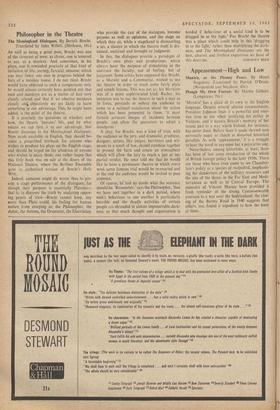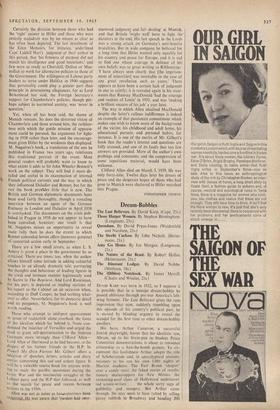Appeasement—High and Low
Munich, or the Phoney Peace. By Henri Nogueres. Translated by Patrick O'Brian. (Weidenfeld and Nieolson, 45s.) Plough My Own Furrow. By Martin Gilbert: ( Long ma ns, 70s.) `MuNK:te has a place of its own in the English language. Despite several altered eircumstanCes, President Johnson finds it a powerful and emo- tive term to use when justifying his policy in Vietnam, and it haunts Britain's memory of her recent past in a way which Ireland, for instance, has never done. Before Suez it made shrewd men nervously eager to clutch at distorted historical parallels. As with 'appeasement,' it is a struggle to hear the word in any sense but a pejorative one Nevertheless, among historians, at least; there has been of late some revaluation of the whole of British foreign policy in the later 1930s. There are those who have even come to see Chamber- lain's policy as a species of realpolitik, emphasis- ing the slenderness of the military resources and the size of the threat in the Far East and Medi- terranean as well as in Central Europe. The memoirs Of Vincent Massey have provided a fresh reminder of the strong Commonwealth aversion to a war over the Sudetenland; the clos ing of the Burma Road in 1940 suggests that others, too, found it expedient to -bow the knee at times.
Certainly the division between those who had the 'right' answer to Hitler and those who were entirely maladroit was by no means as clear as has often been depicted. The last instalment of the Eden Memoirs, for instance, underlined Capt. Liddell Hart's judgment of their author in this period, that 'his firmness of purpose did not match his intelligence and good intentions,' and few were as ready as Churchill, Dalton or Mac- millan to work for alternative policies to those of the Government. The willingness of Labour party leaders to serve under Halifax in 1940 suggests that personality could play a greater part than principle in determining allegiances, for as Lord Birkenhead has said, the Foreign Secretary's support for Chamberlain's policies, though per- haps subject to nocturnal anxiety, was 'never in question.'
Yet, when all has been said, the shame of Munich remains. So does the distorted vision of Chamberlain and those around him, the ruthless- ness with which the gentle mission of appease- ment could be pursued, the arguments for fight- ing in 1938 rather than later, and the encourage- ment given Hitler by the weakness then displayed. M. Nogueres's book, a translation of the one he published in France two years ago, reinforces this traditional portrait of the event. Most general readers will probably want to know to what extent it adds to Sir John Wheeler-Bennett's work on the subject. They will find it more de- tailed and useful in its examination of internal French political currents and the way in which they influenced Daladier and Bonnet, but for the rest the book provides little that is new. The British and German diplomatic documents have been used fairly thoroughly, though a revealing interview between an agent of the German Embassy in London and Daladier in April 1938 is overlooked. The documents on the crisis pub- lished in Prague in 1958 do not appear to have been consulted, however; one result is that M. Nogueres misses an opportunity to reveal more fully than he does the extent to which Bonnet concealed Soviet offers (however genuine) of concerted action early in September.
There are a few small errors, as when L. S. Amery is given a place in the government he so criticised. There are times,•too, when the author allows himself some latitude in adding colourful touches to an already dramatic tale; portraying the thoughts and behaviour of leading figures in the vivid and intimate manner legitimately used by Sartre in The Reprieve. And Lord Runciman, for his part, is depicted as reading sections of his reperrt to the Cabinet on an occasion when, according to Duff Cooper, he had nothing what- ever to offer. Nevertheless, for its domestic detail and its pungency, M. Nogueres's book is well Worth reading.
Those who attempt to interpret appeasement in terms of realpolitik alone,overlook the force of the idealism which lay behind it. None con- demned the injustice of Versailles and urged the need to grant self-determination to the Sudeten Germans more strongly than Clifford -Allen— Lord Allen of Hurtwood as he had becoine. to the disgust of his former friends in the ILP. In Plout,,h My Own Furrow Mr. Gilbert offers a celection of speeches, letters, articles and diary entries concerning this sad and ardent figure. It will be a valuable source book for anyone wish- ing to study the pacifist movement during the Great War and the internecine struggles of the Labour party and the ILP that followed, as well as the search for peace and reason between nations in the 1930s.
Allen was not as naïve as has-sometimes been sugggstqd,..He was aware that 'passion had over- mastered judgment and fair dealing' at Munich, and that Britain 'might well' have to fight the- dictators in the end. His last speech in the Lords was a strong attack on Germany's anti-Semitic brutalities. But in wide company he believes:140r a long time that Hitler wanted only equality for his country and peace for Europe, and it is sad to find one whose courage in defence of his own beliefs was so great writing to Ribbentrop: 'I have always seen clearly that [the imprison- ment of minorities] was inevitable in the case of any great revolution such as yours.' There appears to have been a certain lack of judgment in one so saintly; it is revealed again in his state- ments that Ramsay MacDonald tad the courage and realism of Lenin' in 1931, and was 'making a brilliant success of his job' a year later.
The way in which Allen idealised MacDonald despite the latter's callous indifference is indeed an example of that passionate commitment which makes one wish to know more of the background of the victim; his childhood and adult home, his educational pursuits and personal habits, for instance. It is one of the merits of Mr. Gilbert's book that the reader's interest and questions are fully aroused, and one of its faults that too few answers are provided. More of the author's own probings and comments, and the compression of some repetitious material, would have been welcome.
Clifford Allen died on March 3, 1939. He was only forty-nine. Twelve days later his dream of peace and the desperate hopes of those who had gone to Munich were shattered as Hitler marched into Prague.
CHRISTOPHER THORNE



































 Previous page
Previous page